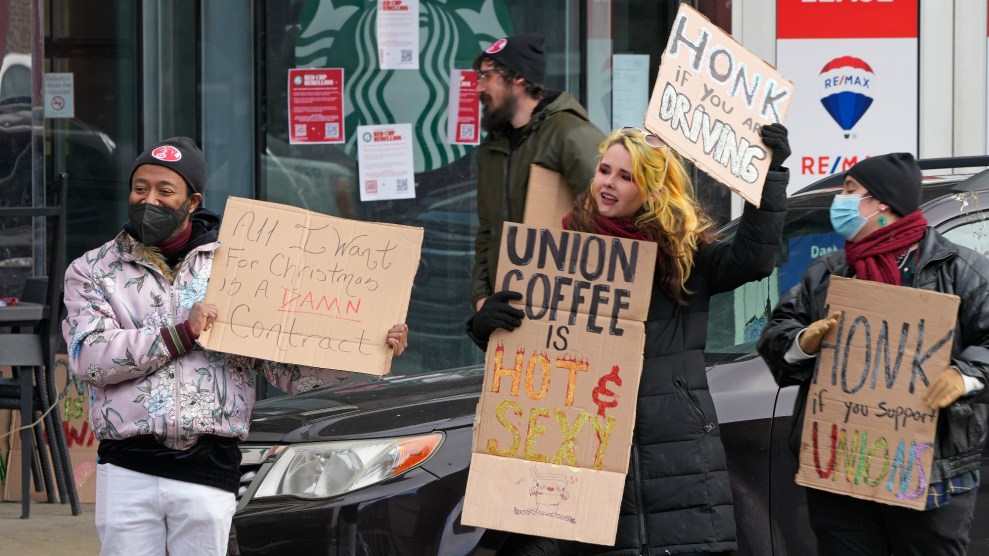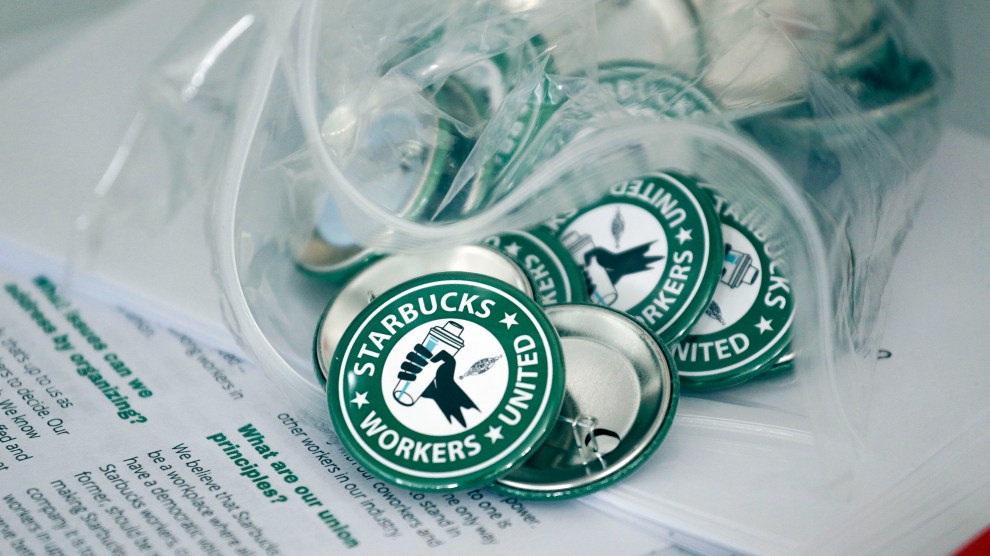
Gene J. Puskar/AP
This piece was originally published by Capital & Main.
In January of 2022, Jacklyn Gabel and her co-workers at the Starbucks Coffee location on Mission Street in Santa Cruz began considering the idea of organizing. Four months later, they voted 15-2 to become part of a labor union, Starbucks Workers United.
The goal, Gabel said, was simple: Come together to more effectively bargain on wages, benefits and working conditions.
So how many negotiating sessions has the union held so far with Starbucks?
“None,” Gabel said. “There has never been a bargaining session.”
Union leaders say this has become a staple of the Starbucks playbook: If it can’t keep a store from unionizing, it can certainly slow-walk any progress toward an actual contract. But as infuriating as that can be for organized workers, perhaps more concerning is how easily federal labor law can be used — or broken — in the service of that goal.
Across the country, employees at more than 350 Starbucks locations (among more than 9,000 company-owned U.S. stores) have now affiliated with Workers United, part of a two-year period of significantly increased organizing activity and public approval of unions. Not one of those Starbucks locations has achieved a contract.
A Starbucks spokesman told Capital & Main that the union’s refusal to schedule bargaining sessions is to blame for the lack of progress. But in the two years since organizing at its stores became widespread, the company has been accused of hundreds of violations of labor law, from firing union organizers to denying benefits in unionized stores to consistently postponing negotiations.
The bottom line: For all the energy spent on organizing, the unionized Starbucks workers aren’t much closer to reaching their goals.
“If you look at what’s happening at both Starbucks and Amazon, sort of newer organizing campaigns, the companies are simply refusing to bargain,” said Sharon Block, a professor at Harvard Law School and director of the Center for Labor and a Just Economy. Labor laws, Block added, do little to hold companies accountable.
The National Labor Relations Board (NLRB) has fielded a raft of complaints from union negotiators regarding Starbucks’ tactics. But the process of moving from a complaint to a finding of wrongdoing is an arduous one, beginning at the regional level and then advancing to the full NLRB.
“And then exactly nothing happens,” Block said.
Only after one of the parties goes to federal court, and the court agrees that the law has been broken, does a remedy kick in—and that is often nothing more than a directive to the offending party to begin bargaining in “good faith,” a term so vague that labor experts say it has almost no enforceable meaning.
It’s all defined by national labor law. And Starbucks, union reps say, is taking full advantage of a broken process.
The company’s recent history of violations is breathtaking. In an attempt to undermine union efforts in Buffalo, New York, an NLRB judge found in March of this year, the company violated the National Labor Relations Act (NLRA) hundreds of times through “egregious and widespread misconduct demonstrating a general disregard for the employees’ fundamental rights.”
That fits a pattern. In 22 separate decisions (out of 23 cases) through early August, administrative judges have found that Starbucks committed more than 230 federal labor law violations, including 30 firings related to organizing activity, according to Workers United spokesperson Melissa Palominos. More than 1,350 additional alleged violations are awaiting disposition, Palominos said.
“They are the worst union buster in history, and we will continue to pursue all legal challenges,” said Palominos. “In the meantime, Starbucks workers continue to successfully unionize their stores.”
Gabel, 35, has worked at the Santa Cruz location for four years and is a shift supervisor. She and her colleagues had taken notice of organizing action in Buffalo, and they began considering doing the same. Once they filed for a union election, she said, the store was inundated by regular visits from Starbucks district and regional supervisors who previously had seldom showed up.
“Our reasons for organizing were pretty simple,” Gabel said. “The base pay was about $15.50, and Santa Cruz County at the time was the second-highest rental market in the country. What might work elsewhere in the country didn’t work in Santa Cruz, so we needed to talk about wages. Starbucks’ structure doesn’t really allow for that.”
Since unionizing, though, nothing has changed. Gabel said the company’s negotiators have consistently refused or moved dates in response to the union’s requests for meetings, beginning with a session last December that was called off after Starbucks said it would not agree to anyone participating virtually. (Gabel, a member of the negotiating team, had COVID.)
“They had previously done virtual bargaining in other cities, and then they announced that they just no longer would do it,” Gabel said. “So they’ll send us a date and we’ll try to schedule it, because our negotiating team is from different places. If we can get everybody on board, they’ll then come back and say that date won’t work, and we go through the whole process again. We haven’t had a meeting, and now there’s not one scheduled until December.”
Responding to questions from Capital & Main about the Santa Cruz store, Starbucks spokesman Andrew Trull blamed the union for a number of the delays, specifying seven different dates (beginning with the one last December) on which he said Starbucks Workers United “either canceled, failed to confirm or failed to respond” to the company’s requests to negotiate.
Further, Trull said, “Under the NLRA, parties in bargaining have a legal right to refuse to be recorded during contract negotiations”—the reason Starbucks won’t agree to virtual sessions. “When bargaining is broadcast virtually to other participants, it is tantamount to having bargaining sessions recorded,” Trull said. “There is no way to prevent remote participants from recording and retransmitting discussions related to partners at each store.”
Palominos said that after the December 2022 date was canceled, the company’s negotiators said they would confirm alternate dates “only if we agreed there would only be participants in person.” It was a plan to stymie the union, she said, since the Starbucks Workers United negotiating team is national in scope.
An NLRB counsel in March determined that Starbucks was violating federal law by refusing hybrid negotiating, in which some members attend virtually. That finding cleared the way for NLRB complaints at the regional level. But again, that’s only the beginning of the long process toward any national finding or remedy.
It was tactics like these that prompted Vermont Sen. Bernie Sanders, as he opened a session of the Senate Health, Education, Labor and Pensions (HELP) Committee earlier this year, to go after Starbucks on the day that former CEO Howard Schultz appeared there under threat of subpoena.
“What is outrageous to me,” Sanders said, “is not only Starbucks’ anti-union activities and their willingness to break the law — it is their calculated and intentional efforts to stall, stall, stall.”
When Sanders, the HELP chair, subsequently asked Schultz if he was aware that NLRB judges had concluded Starbucks repeatedly broke labor law, Schultz replied, “Sir, Starbucks Coffee Company unequivocally—let me set the tone for this very early on—has not broken the law. We’re confident that those allegations will be proven false.”
Schultz’s words were met with laughter and groans from the gallery, much of which was occupied by members of Starbucks Workers United. As Connecticut Sen. Chris Murphy said later, “It is akin to someone who has been ticketed for speeding 100 times saying, ‘I’ve never violated the law, because every single time, the cop got it wrong.’”
Back in Santa Cruz, Jacklyn Gabel and her colleagues continue to work—and hope for a negotiated contract. “What Starbucks is doing is only energizing and empowering my co-workers,” said Gabel, who also spends time helping other locations get union elections. “We are organizing more and more stores. Their tactics aren’t going to stop that.”
Until the law is fitted with some teeth, though, companies trying to tamp down union activity or freeze contract negotiations have plenty of room to roam. Some of it may be ruled illegal, but almost none of it will result in the kind of penalty that is actually a deterrent. And in the meantime, the long stall goes on.
“We shouldn’t have a law that invites noncompliance,” Block said. As Gabel and her colleagues are learning, that’s exactly the kind of law that is currently in place.
Copyright Capital & Main
















